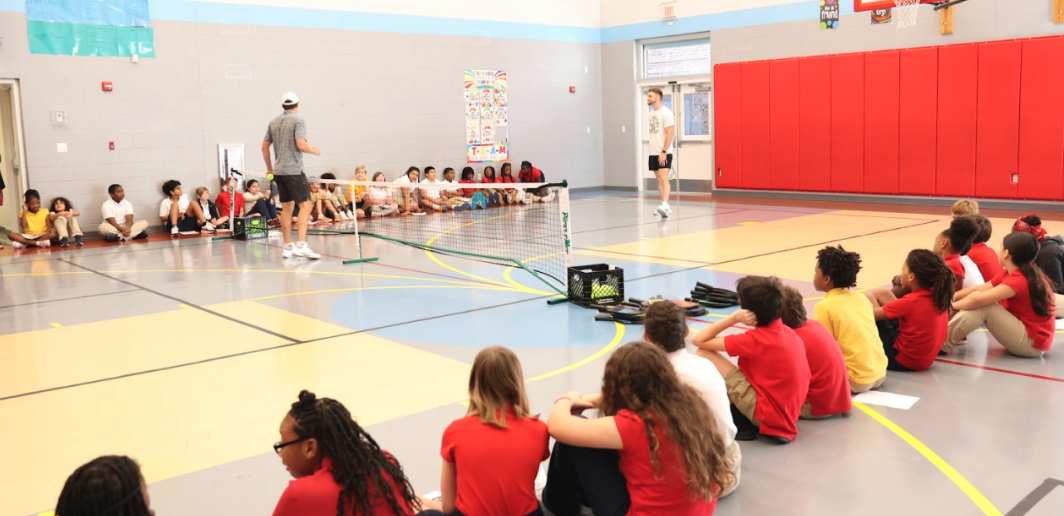
WHEN SHOULD MY CHILD STAY HOME?
We want your child to come to school, but please do NOT send a child to school if he/she has had a fever of 100.0° or higher within the past 24 hours, has been vomiting or having diarrhea within the past 24 hours, has a frequent cough, complains of severe sore throat or headache, or has untreated pink eye.
Children must be fever-free, vomit-free, and/or diarrhea-free (without the help of medication) for 24 hours before returning to school, and should not have a frequent cough. Report absences due to contagious disease to the school nurse office so that precautionary measures may be taken for those exposed. Children prescribed antibiotics can usually return to school 24 hours after the first dose.
WHAT DO I DO IF MY CHILD GETS SICK AT SCHOOL?
If your child becomes ill at school, his or her teacher will send him or her to the nurse’s office for evaluation. If necessary, the nurse will call parents, or emergency contacts if needed, to make arrangements for your child to be picked up, or to provide necessary medical care. Students who need to be sent home sick should be picked up from school within 90 minutes of the school contacting a guardian. This minimizes exposure to other students and staff members, and helps your child feel more comfortable.
WHAT DO I DO IF MY CHILD HAS A MEDICATION THAT THEY NEED TO HAVE AT SCHOOL?
Please see the “Medication” section of the CCS Family Handbook for all medication-related procedures. All medications must be delivered to and picked up from school by a parent or guardian. Students are not permitted to carry medications on school grounds during school hours, or on a school bus.
WHAT IS THE LICE PROTOCOL?
If your child is complaining of an itchy head, please check their scalp for lice or nits (eggs). Nits are distinguishable from dandruff because they stick to the hair, close to the scalp. Check around the ears and across the back of the neck first, then check the rest of the head.
If your child has live adult lice, they should have them removed, or complete a lice treatment, prior to returning to school. Students who are found to have lice adult lice at school will be sent home until the lice can be addressed. Students who are only found to have nits do not need to be excluded from school as nits cannot be transmitted to other people. However, they will still need to have the nits removed daily until none remain, to ensure they don’t develop into lice. Combing with a lice removal comb is the most important step.
If you are seeing adult lice, your child has likely been living with lice for no less than 2-3 weeks, often longer. Itching can take 4 weeks to begin, especially if it’s the first time your child has had lice. If the school nurse is made aware of two or more cases of lice in the same classroom within a month, she will notify those families, and may determine that a class-wide lice screening is necessary. These are done infrequently, as most lice-spreading occurs in the home, and it is difficult to be discreet if someone is found to have lice and is sent home.
WHAT ARE THE HEALTHE KIDS SCREENING
Crossroads is pleased to offer FREE, comprehensive health screenings for all students from Kindergarten through 8th grade. These screenings, conducted by medical personnel from the Oracle Health Foundation, are held during the school day each fall. Permission forms are sent out through Infinite Campus annually, and are also available in paper format. Parents or guardians will receive the screening results in a sealed envelope after the screenings are completed.
DOCUMENTATION
Please complete these documents and give them to the nurse at your campus if your child has asthma, a food allergy, seizures, diabetes, and/or needs medicine during the school day:
Asthma History Parent Questionnaire
Allergy History Parent Questionnaire
Diabetes History Parent Questionnaire
Seizure/Epilepsy History Parent Questionnaire
Medication Administration Parent Authorization
Emergency Medication Self-Carry Paperwork (for CPA Students)
Crossroads Charter Schools is pleased to provide a nurse at each campus to help ensure the health, wellbeing, and safety of our students and staff.
- Central Street – Eva Copeland (Lead Nurse)
- Quality Hill – Judith DelPorto
- Crossroads Prep Academy – Jenny Taylor
WHEN SHOULD MY CHILD STAY HOME?
We want your child to come to school, but please do NOT send a child to school if he/she has a fever of 100.0° or higher, has been vomiting or having diarrhea, has a frequent cough, complains of severe sore throat or headache, or has untreated pink eye.
Children must be fever-free, vomit-free, and/or diarrhea-free (without the help of medication) for 24 hours before returning to school, and should not have a frequent cough. Report absences due to contagious disease to the school nurse office so that precautionary measures may be taken for those exposed. Children prescribed antibiotics can usually return to school 24 hours after the first dose.
WHAT DO I DO IF MY CHILD GETS SICK AT SCHOOL?
If your child becomes ill at school, his or her teacher will send him or her to the nurse’s office for evaluation. If necessary, the nurse will call parents, or emergency contacts if needed, to make arrangements for your child to be picked up, or to provide necessary medical care. Students who need to be sent home sick should be picked up from school within 90 minutes of the school contacting a guardian. This minimizes exposure to other students and staff members, and helps your child feel more comfortable.
WHAT DO I DO IF MY CHILD HAS A MEDICATION THAT THEY NEED TO HAVE AT SCHOOL?
Please see the “Medication” section of the CCS Family Handbook for all medication-related procedures. All medications must be delivered to and picked up from school by a parent or guardian. Students are not permitted to carry medications on school grounds during school hours, or on a school bus.
WHAT IS THE LICE PROTOCOL?
If your child is complaining of an itchy head, please check their scalp for lice or nits (eggs). Nits are distinguishable from dandruff because they stick to the hair, close to the scalp. Check around the ears and across the back of the neck first, then check the rest of the head.
If your child has live adult lice, they should have them removed, or complete a lice treatment, prior to returning to school. Students who are found to have lice adult lice at school will be sent home until the lice can be addressed. Students who are only found to have nits do not need to be excluded from school as nits cannot be transmitted to other people. However, they will still need to have the nits removed daily until none remain, to ensure they don’t develop into lice. Combing with a lice removal comb is the most important step.
If you are seeing adult lice, your child has likely been living with lice for no less than 2-3 weeks, often longer. Itching can take 4 weeks to begin, especially if it’s the first time your child has had lice. If the school nurse is made aware of two or more cases of lice in the same classroom within a month, she will notify those families, and may determine that a class-wide lice screening is necessary. These are done infrequently, however, as most lice-spreading occurs in the home, and it is difficult to be discreet if someone is found to have lice and is sent home.
OTHER SPECIFIC DISEASES
Please note that the above requirements are our guidelines for illnesses in general. It may be that if your child receives a specific diagnosis, such as Strep, Flu, etc., they will have to remain out of school for a longer period of time. If your child is diagnosed with a specific contagious illness, please alert your school nurse so they can provide guidance on when your child may be able to return to school.
UPDATED COVID ILLNESS GUIDANCE – AUGUST 28, 2024
Crossroads has updated their COVID illness guidance to match the CDC’s Respiratory Virus Guidance. As with other respiratory illnesses, students who are positive for COVID should remain at home until they are fever-free for a full 24 hours without taking any fever-reducing medications, and their other symptoms (such as cough, sore throat, fatigue, etc.) should be improving. After returning to school, students who were out with any respiratory illness, including COVID, should take added precautions for at least 5 days, including wearing a mask to school, performing frequent hand hygiene, and avoiding close contact with others. HERE is a snapshot of the updated guidance.
WHAT ARE THE HEALTHE KIDS SCREENINGS?
Crossroads is pleased to offer FREE, comprehensive health screenings for all students from Kindergarten through 8th grade. These screenings, conducted by medical personnel from the First Hand Foundation, are held during the school day each fall. Permission forms are sent out through Infinite Campus annually, and are also available in paper format. Parents or guardians will receive the screening results in a sealed envelope after the screenings are completed.
DOCUMENTATION
Please complete these documents and give them to the nurse at your campus if your child has asthma, a food allergy, seizures, diabetes, and/or needs medicine during the school day:
- Asthma History Parent Questionnaire
- Allergy History Parent Questionnaire
- Diabetes History Parent Questionnaire
- Seizure/Epilepsy History Parent Questionnaire
- Medication Administration Parent Authorization 23-24
- Emergency Medication Self-Carry Paperwork

